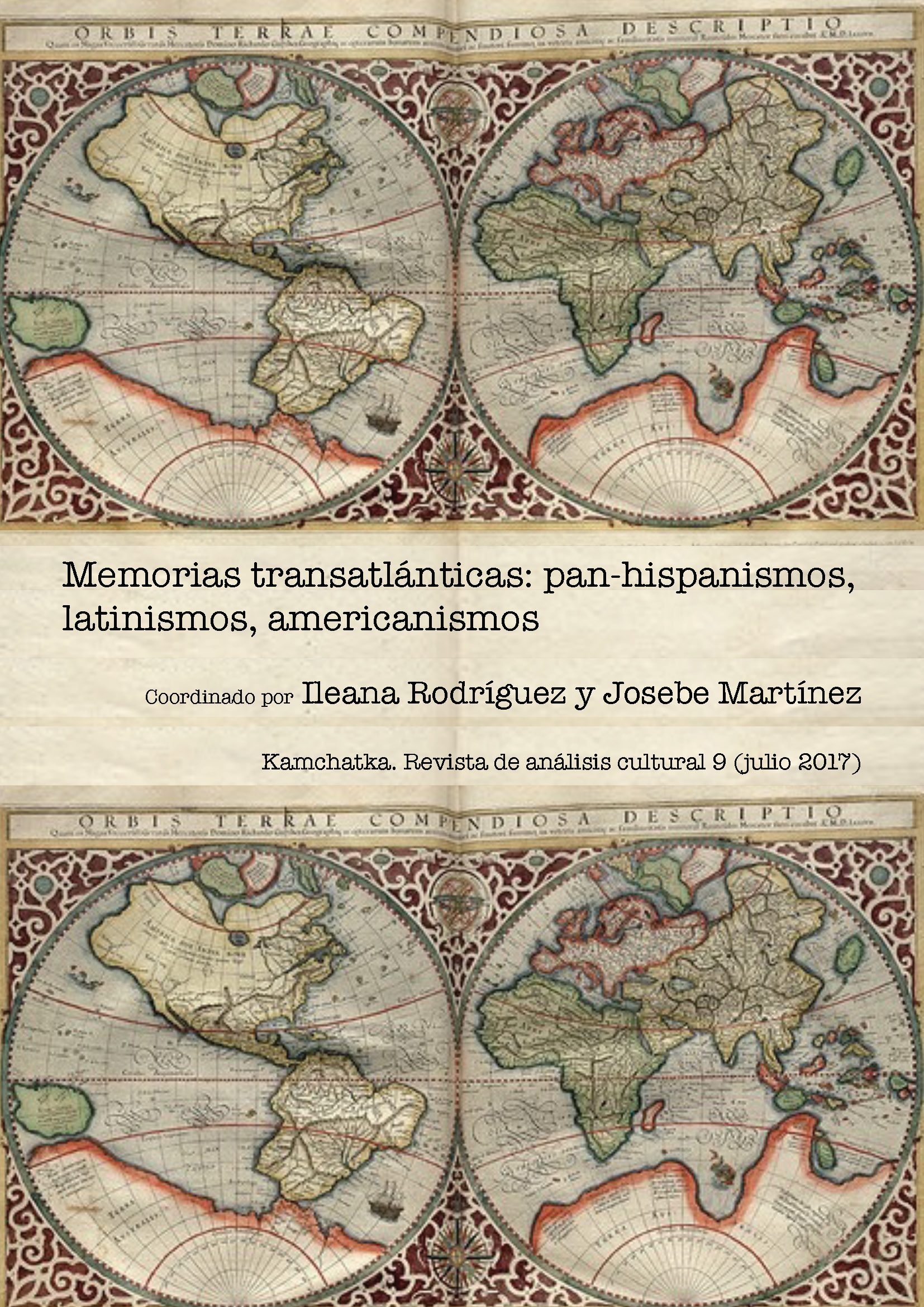Gaitas, panderos y tambores. La nueva música gallega y una identidad glocalizada / Bagpipes, tambourines and drums. New Galician Music and a Glocalized Identity
DOI:
https://doi.org/10.7203/KAM.9.9557 Abstract
Abstract
Resumen: La música gallega ha jugado un papel importante en la interpretación de la identidad gallega. En las últimas décadas, los nuevos movimientos musicales y algunas propuestas de relectura del floklore gallego en relación con otras tradiciones musicales ha abierto las puertas a una redifinición de la ‘galleguidad’ desde una perspectiva glocalizada, que incorpora tanto elementos tradicionalmente asociados a lo gallego como dispositivos y estilos propios de otras tradiciones.
Palabras clave: Identidad, Galicia, Música, Glocalización.
Abstract: Galician music has played an important role in the interpretation of Galician identity. In the last decades, the new musical movements and some proposals of rereading of the Galician floklore in relation to other musical traditions have opened the doors to a redefinition of the ‘Galleguidad’ from a glocalizated perspective, that incorporates both elements traditionally associated to the Galician indentity and some other cultural styles and traditions.
Key words: Identity, Galicia, Music, Clocalization.
 Downloads
Downloads
 References
References
“About Ialma”. Grupo Ialma (1/ 07/ 2009).
“Alalá No. 3: Cantareiras de Laxoso”. CRTVG (28 / 02/ 2006).
“A rianxeira : su historia y su letra”. Galicia Espallada (29 /06/ 2009).
Anderson, Benedict R. (1991). Imagined Communities: Reflections on the Origin and Spread of Nationalism. London and New York: Verso.
Appadurai, Arjun (1996). Modernity at Large: Cultural Dimensions of Globalization. Minneapolis,:London: University of Minnesota Press.
Cagiao Vila, Pilar, and Teresa García Domínguez (1997). Muller e emigración. Xunta de Galicia: Santiago de Compostela.
Colmeiro, José. “Peripheral Visions, Global Positions: Remapping Galician Culture”. Bulletin of Hispanic Studies 86.2 (2009): 213-230.
Colmeiro, José. “Smells Like Wild Spirit: Galician Rock Bravú, Between the
Rurban and the Glocal.” Journal of Spanish Cultural Studies 10/2 (2009b): 225-240.
Conradson, David y Alan Latham. “Transnational Urbanism: Attending to Everyday Practices and Mobilities”. Journal of Ethnic and Migration Studies 31.2 (2005): 227-233.
Connell, John y Chris, Gibson (2003). Sound Tracks: Popular Music, Identity and Place. London and New York: Routledge.
Correa, Anxa. “Uxía plasma en un nuevo disco su 'Eterno navegar' por el Atlántico.” El Progreso. (12 /03/2008).
Curiel, Xoán (2008). “Nai.” Xoán Curiel Web Oficial.
Faist, Thomas. “Transnationalization in international migration: implications for the study of citizenship and culture”. Journal of Ethnic and Racial Studies 23.2 (2000): 189–222.
García Canclini, Néstor (1995). Hybrid Cultures: Strategies for Entering and Leaving Modernity. Minneapolis: University of Minnesota Press.
Glick Schiller, Nina, Linda Basch y Cristina Szanton Blanc. “From Immigrant to Transmigrant: Theorizing Transnational Migration”. Anthropology Quartely 68.1 (1995): 48-63.
Hedetoft, Ulf (1998). “Constructions of Europe: Territoriality, Sovereignty, Identity: Disaggregations of Cultural and Political Space”. Territoriality in Modern Society. Stefan Immerfall, (ed.). Berlin y New York: Springer:173-204.
Hobsbawm, E. J. (1990). Nations and Nationalism since 1780: Programme, Myth, Reality. Cambridge and New York: Cambridge University Press.
“Ialma da ‘100 voltas’.” Vieiros. (7/05/ 2008).
Leyshon, Andrew, David Matless y George Revill. “The Place of Music: Introduction”. Transactions of the Institute of British Geographers, New Series 20.4 (1995): 423-433.
Núñez Seixas, Xosé-Manoel. “History and Collective Memories of Migration in a Land of Migrants: The Case of Iberian Galicia.” History & Memory 14/1-2, (2002): 229-258.
Rivas, Manuel (1999). “O saxo na néboa.” ¿Que me queres amor? Vigo: Editorial Galaxia: 35-52.
Rivas, Manuel. “Galicia contada a un extraterrestre.” El País Semanal 1,307 (2001): 38-52.
Rivas, Manuel. “Afrogallegos.” El País Semanal (2002): 1-2.
Rivero, Marta. “Mozas da Ialma”. Visado: Faro de Vigo 220 (2006): 55-62.
Rodríguez-Galdo, María Xosé (1993). Galicia, país de emigración: La emigración gallega a América hasta 1930. Gijón: Colombres.
Romero, Eugenia R. “Amusement Parks, Bagpipes and Cemeteries: Fantastic
Spaces of Galician Identity through Migration”. Journal of Spanish Cultural Studies 7.2 (2006): 155-169.
Scruggs, T. M. “Let’s Enjoy as Nicaraguans”: The Use of Music in the Construction of a Nicaraguan National Consciousness”. Ethnomusicology 43.2 (1999): 297-321.
Senlle, Uxía. Uxía. Página oficial.
Señoráns, Andrés Javier. ‘‘Entrevista a ‘Os Furafoles’’’. A Grileira: Revista de Musicología Y Archivo Histórico de la Fundación Xeito Novo de Cultura Gallega 7 (2003): 1-5.
Stokes, Martin (1994) “Introduction: Enthnicity, Identity and Music.” Ethnicity, Identity and Music: The Musical Construction of Place. Oxford, Providence: BERG: 1-27.
Toro Santos, Xelís de (2002). ‘‘Bagpipes and Digital Music: The Remixing of
Galician Identity.’’ Constructing Identity in Contemporary Spain: Theoretical
Debates and Cultural Practice. Ed. Jo Labanyi. New York and Oxford: Oxford University Press: 237-54.
Villares Paz, Ramón y Marcelino Fernández-Santiago (1996). Historia da Emigración galega a América. Xunta de Galicia: Santiago de Compostela.
Villares Paz, Ramón y Marcelino Fernández-Santiago (2009). “Un festeiro intermitente.” Experiencias en Ortigueira. Festival de Ortigueira. Consello de Ortigueira.
Discografía
Ebb, Fred & John Kander (1990). “New York, New York”. The Reprise Collection, Disc 4: Duets. Reprise: Capitol.
Núñez, Carlos (2009). Alborada do Brasil. BR.
Siniestro Total (1984). “Miña Terra Galega”. Menos mal que nos queda Portugal. DRO.
Downloads
Published
How to Cite
-
Abstract1545
-
Artículo (Español)3868
Issue
Section
License
This journal provides an immediate free access to the content on the principle that freely make investigation available to the public, which promotes an increased global knowledge exchange.
Unless otherwise indicated, texts published in this journal are under the license Attribution-NonComercial 4.0 by Creative Commons. These texts may be copied, distributed and publicly communicated whenever the publication’s author and title are quoted and whenever they are not used for commercial purposes. In any case, intellectual property of the articles and its potential economic rights entirely belong to its authors.
The full license can be consulted on https://creativecommons.org/licenses/by-nc/4.0/. We encourage authors to disseminate papers published in Kamchatka. Journal of cultural analysis electronically, in institutional digital repository or in their websites.





